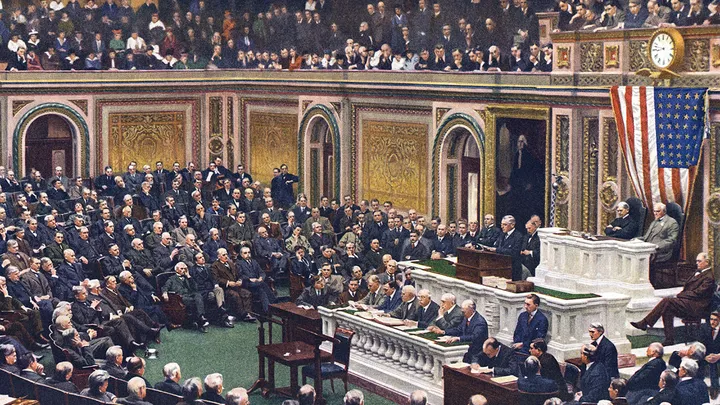On this day in history, April 6, 1917, US enters World War I as Congress votes to declare war on Germany
Published: 6 April 2023
By Kerry J. Byrne
via the Fox News web site

GettyImages-566465045
President Woodrow Wilson addresses Congress to declare war on Germany in World War I 1917. (Universal History Archive/Universal Images Group via Getty Images)
America sent ‘the word over there that the Yanks are coming’ amid shocking German threats
The United States plunged ferociously into World War I following a vote in the House of Representatives on this day in history, April 6, 1917.
President Woodrow Wilson requested a declaration of war against Germany before a joint session of Congress on April 2, as the United States faced both the threat of unrestricted submarine warfare from Germany and the potential of its alliance with Mexico to seize vast swaths of the American West.
The Senate voted in favor of the war declaration two days later.
Congress concurred on April 6.
The United States was now committed to the tragic Great War, which had consumed much of Europe since 1914.
The declaration came just five months after Democrat Wilson narrowly won reelection over Republican challenger Charles Evan Hughes by campaigning for peace.
“The present German submarine warfare against commerce is a warfare against mankind,” Wilson said in his April 2 address.
“It is a war against all nations. American ships have been sunk, American lives taken … and people of other neutral and friendly nations have been sunk and overwhelmed in the waters in the same way. There has been no discrimination. The challenge is to all mankind. Each nation must decide for itself how it will meet it.”
Germany sparked outrage in the United States when one of its submarines sank the British cruise ship Lusitania in 1915, killing 1,200 people, including 128 Americans.
Yet the U.S. resisted entry into the war.

(Original Caption) 1/25/1918 in Pipus, France: General Pershing (1860-1948), Marshall (1880-1959), Joffre (1852-1931), and party arrive at Pipus, France, where Lafayette is buried. (Getty Images)
Germany briefly agreed to end unrestricted submarine attacks in 1916, but reneged on its promise in January 1917.
The renewed threat was accompanied by news on March 1 that officials in Britain had decoded the infamous Zimmerman Telegram.
The message from German Foreign Minister Arthur Zimmermann to Mexican leaders offered to help America’s border rival capture U.S. territory it lost during the Mexican-American War of 1846-48.
“The Zimmermann Telegram galvanized American public opinion against Germany once and for all,” writes the National World War I Museum.
The American people, long desperate to avoid sending their boys to fight and die on foreign soil, responded with a nationwide burst of patriotic commitment to the cause in alliance with France and Great Britain.
Read the entire article on the Fox News web site.
External Web Site Notice: This page contains information directly presented from an external source. The terms and conditions of this page may not be the same as those of this website. Click here to read the full disclaimer notice for external web sites. Thank you.



